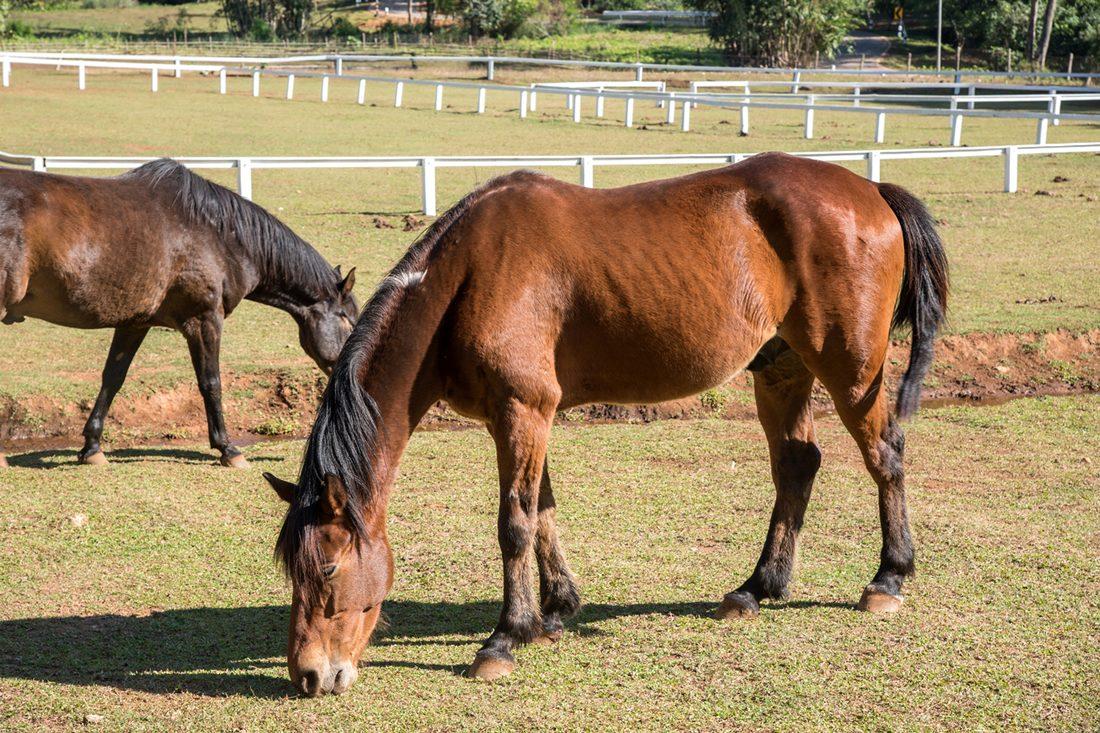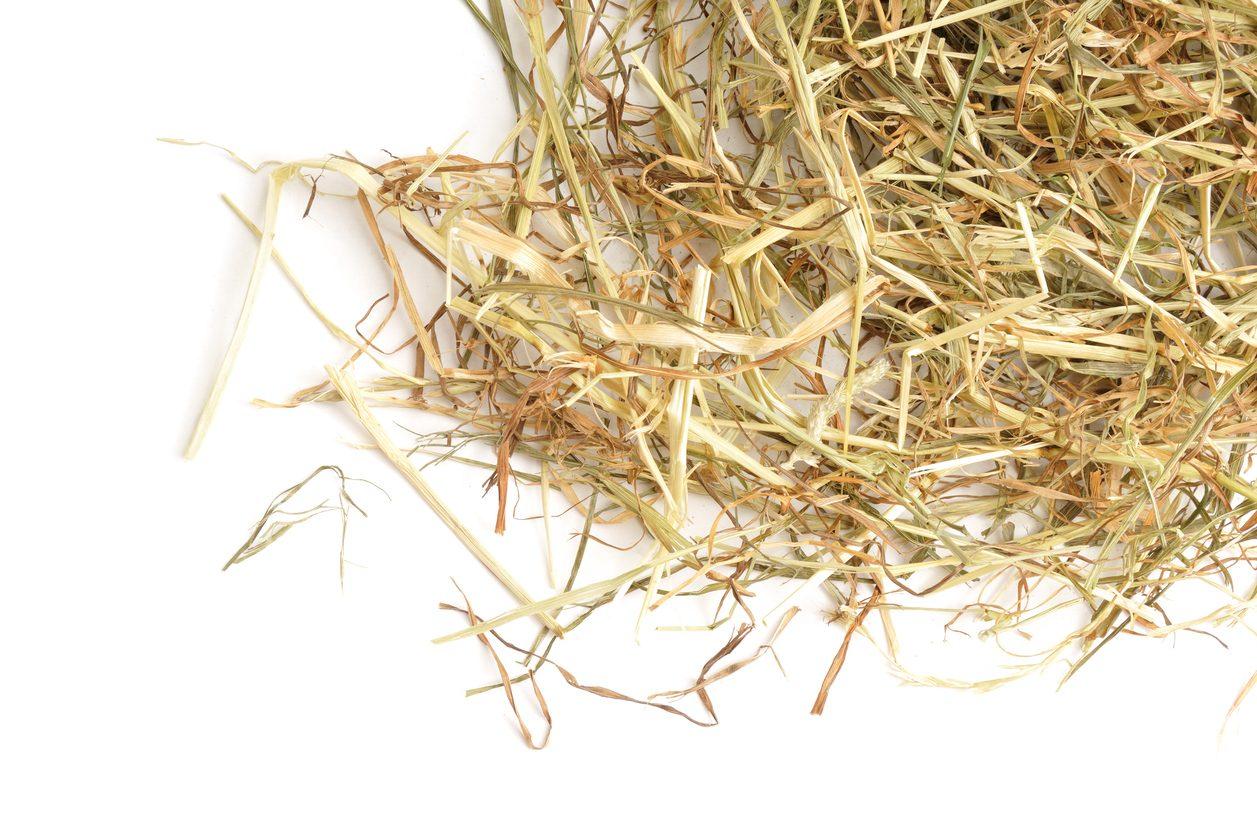Inflammatory bowel disease (IBD) is a broad term that describes a group of diseases marked by inflammation in the gastrointestinal tract of the horse.
Horses with IBD may show outward signs including recurrent colic, diarrhea, weight loss, and low energy levels.
IBD in horses is a rare, but severe, inflammatory condition that affects gut permeability and nutrient absorption. [1] In some types of IBD, other tissues are also affected causing a broader range of symptoms that can include skin lesions and anemia.
Although the exact cause of IBD is unknown, it is thought to involve an abnormal immune response to bacteria, parasites, or dietary components that are normally present in the gut. [1]
IBD is a serious condition that significantly increases the risk of colic in affected horses. Because it can dramatically affect nutrient absorption, it is often associated with weight loss even when the horse’s appetite is normal.
Genetics are likely to play a role in IBD, as Standardbreds are more likely to develop this condition. However, dietary strategies such as providing more frequent small meals of highly digestible, simple feeds may help alleviate symptoms and improve gut function in affected horses.
Consult with your veterinarian and equine nutritionists if you suspect IBD or other gut disorders in your horse. You can submit your horse’s diet for complementary evaluation by our equine nutritionists to optimize nutritional support of gut health.
What is Inflammatory Bowel Disease?
In healthy animals, immune responses occur when an unknown or potentially harmful substance enters the body, including pathogens such as bacteria and viruses.
IBD occurs in horses when there is an abnormal immune response to harmless bacteria and other substances.
In the case of IBD, white blood cells from the immune system infiltrate the intestinal lining of the small intestine which disrupts cells that absorb nutrients, secrete hormones and produce the mucous barrier. [2]
These horses often have severely low levels of protein in the blood because of poor absorption and enteric loss of proteins, meaning protein from the blood enters the intestine.

Symptoms of IBD in Horses
As with many immune-mediated diseases, a variety of symptoms can present in the horse, most of which are also symptoms of other diseases, making diagnosis difficult. [1]
Common symptoms include:
- Weight loss despite proper nutrition
- Decreased appetite despite normal oral exam
- Poor body condition
- Diarrhea (if the large intestine is affected as well)
- Abdominal swelling (edema)
- History of mild colic or concurrent episodes of coli
Many of these symptoms can present in a horse with poor gut health. This does not mean every horse with poor gut health has IBD as there can be many causes of gastrointestinal dysfunction in horses.
These symptoms always warrant a visit by your veterinarian to determine the underlying cause. You may need to make adjustments to your horse’s environment, routine or feeding program to better support immune and gut health.
Horses that struggle to maintain a healthy weight or have inconsistent stool quality would likely benefit from a forage-first feeding program that is rich in fibre. Diets that are high in grain are more likely to lead to gut dysfunction.
Horses with digestive issues may also benefit from a comprehensive gut health supplement such as Mad Barn’s Optimum Digestive Health pellets.
Optimum Digestive Health contains probiotics, prebiotics, yeast, toxin binders and digestive enzymes to support digestion, immune function and a healthy microbial balance in the gut.
Types of Inflammatory Bowel Disease
Several types of IBD are diagnosed depending on the specific type of white blood cell that invades the intestinal lining. [1][9]
1) Eosinophilic Enterocolitis and Multisystemic Eosinophilic Epitheliotropic Disease (MEED)
Eosinophilic enterocolitis is inflammation of the intestine caused by eosinophil and lymphocyte (two types of white blood cells) intrusion into the lining of the small intestine as well as the large intestine. Horses with this condition often develop colic.
A more severe version of this condition is called multisystemic eosinophilic epitheliotrophic disease (MEED) which affects the small intestine and other organs including the liver, skin, and lungs.
Horses with MEED often have very poor skin quality and even skin lesions, which can be used to diagnose MEED via biopsy.
Causes:
The cause of eosinophilic enterocolitis or MEED is thought to be an allergic response, to an inhaled, dietary or parasitic antigen. It is thought that MEED might be caused by larvae (eggs) of parasites that infect several tissues.
Epidemiology:
Eosinophilic enterocolitis and MEED appear to be most common in young Standardbred and Thoroughbred horses. However, horses of any sex, breed, or age can be affected.
2) Granulomatous Enteritis (GE)
This type of IBD is similar to Crohn’s Disease in humans and Johne’s disease in cattle. Like all forms of IBD, the exact cause is unknown, but again, it is thought to be an abnormal immune response to bacteria or dietary components.
It often affects the ileum (most distal) segment of the small intestine.
Most horses affected by GE have chronic weight loss, poor appetite and anemia (low red blood cell count).
Causes:
Granulomatous enteritis is caused by lymphocyte and macrophage intrusion of the intestinal lining of the small intestine.
This disease causes microvilli in the intestine to shrink which reduces the total surface area available for absorption of nutrients. These horses often have malabsorption, including poor absorption of simple sugars like glucose which leads to significant weight loss.
Epidemiology:
Granulomatous enteritis appears to be more common in young Standardbred horses and can have a genetic origin.
3) Lymphocytic/Plasmacytic Enteritis and Lymphosarcoma
Very few horses (20 in total) have been reported in the literature with lymphocytic/plasmacytic enteritis (LPE).
It is thought that LPE is an early stage of intestinal cancer, known as intestinal lymphosarchoma.
Causes:
Lymphocytic/plasmacytic enteritis (LPE) involves lymphocytes or plasma cells entering the intestinal lining.
Uncontrolled growth of lymphocytes in the intestine can lead to lymphosarcoma. Although this is a form of cancer, it is also classified as a type of IBD.
Due to the severity of this disease, the prognosis is often very poor and most horses do not respond to treatment.
Epidemiology:
There are no known age, sex, or breed predispositions to either form of IBD.

Diagnosis and Treatment
Assessment for Equine IBD should be considered for horses with unexplained weight loss, recurrent colic, and persistent issues with skin quality.
The only way to definitively confirm an IBD diagnosis is through biopsies of the full thickness of the intestinal wall. These would be obtained during exploratory laparoscopy and post-mortem analysis. [8]
Less invasive techniques are commonly used but the results are more difficult to interpret.
In order to rule out other disorders such as hindgut acidosis or colic, several diagnostic tests can be performed. [1]
Blood work:
Results from bloodwork often show increased white blood cells and low protein levels (hypoproteinemia).
With MEED, other blood values may be abnormal depending on what other organs have been affected.
Oral glucose or xylose absorption test:
This measures how much sugar (glucose or xylose) is absorbed from the gut. The horse is given oral glucose or xylose and blood samples are then taken at several points after administration to measure absorption or lack thereof.
Rectal exam:
This allows your veterinarian to palpate the small intestine to feel for thickening of the intestinal wall.
If thickening detected, an ultrasound of the abdomen can provide a much clearer picture of the small intestine, and measurements of the thickness of the intestinal wall can help determine disease severity.
Biopsy:
Along with an ultrasound, either a duodenal (the first portion of the small intestine) or a rectal biopsy can be done to detect immune cells in the tissue.
However, these biopsies don’t obtain a sample from the full thickness of the intestinal lining and therefore interpretation is limited. If skin lesions are present, a skin biopsy can be useful to provide a diagnosis.
These tests have different levels of diagnostic power and invasiveness. Laparoscopic surgery to obtain intestinal tissue provides the most precise information but is also the most invasive.
The pros and cons of each technique will need to be weighed by your veterinarian to determine which is appropriate in each case.
Treatment
Once a diagnosis is made, or other diseases are ruled out how can you treat IBD and what is the outcome?
Unfortunately, prognosis is considered moderate to poor for most horses.
IBD is a serious condition that might require surgery to remove diseased intestinal tissue. This is only likely to be effective in a small number of cases where the inflammation is restricted to a relatively small area of the intestine.
In most cases, long-term use of corticosteroids such as dexamethasone or prednisone is required to reduce the inflammatory response. Corticosteroids should only be administered in consultation with your veterinarian.
Some horses may need to remain on a low dose steroid for the rest of their life if symptoms return after steroid use has been discontinued. [1]
Parasites are thought to play a role in this disease, particularly in MEED. Deworming with anthelmintic drugs that kill the larvae might be beneficial.
A clinical study of 20 horses diagnosed and treated for IBD, evaluated the use of a dewormer (for one week) and corticosteroids (for 3 weeks) on IBD outcomes. [7]
After 3 weeks, 15 out of 20 horses showed improvement and were tapered off the steroid. The other 5 were started on a different steroid. At the three-year follow-up, 6 of the 20 horses had died.
Of the horses that responded to the initial treatment, there was an 80% survival rate at 3 years, suggesting that initial response to treatment is a predictor of long-term prognosis.
IBD in Foals
When IBD is diagnosed in foals, it is often due to bacterial infection of the intestinal wall. Foals are particularly susceptible to IBD around weaning (age 4 – 7 months) when they experience new stressors and exposure to unfamiliar pathogens. [1]
Two types of bacteria have been identified as the main culprits of IBD in foals, namely Lawsonia intracellularis and Rhodococcus equi. Foals mixed into a herd might be exposed to contaminated feces that contains these pathogens.
Lawsonia intracellularis
Infection with the bacteria Lawsonia intracellularis causes a condition called proliferative enteropathy.
This occurs when the bacteria invade cells of the intestinal wall called enterocytes and cause them to replicate. This alters the structure of the intestine and impairs nutrient absorption.
This infection is primarily diagnosed in foals from 4 to 7 months of age and causes hypoproteinemia, severe depletion of protein levels in the blood. It can also cause accumulation of fluid in the abdomen and electrolyte imbalances.
Proliferative enteropathy can be diagnosed by the presence of antibodies in the blood or a fecal test that detects the bacteria. Treatment involves intravenous and oral antibiotics for several weeks to months after diagnosis and is very often successful if caught early.
Rhodococcus equi
This bacteria is commonly found in soil but does not cause issues for older horses who have a mature immune system. Young foals that inhale Rhodococcus equi can develop a severe case of pneumonia which is the most common condition associated with this pathogen.
Manure from foals that develop Rhodococcus equi pneumonia can contain high levels of this pathogen and contaminate the environment.
Foals that ingest this pathogen from the soil or contaminated manure can develop IBD due to infiltration of the intestinal wall. These foals typically present with fever, depression, anorexia, weight loss, colic and diarrhea.
With effective treatment, including several weeks of antibiotics, most foals survive and develop immunity to this bacteria.
Young foals (under 4 months of age) showing signs of pneumonia should be evaluated by your veterinarian. They should be isolated to minimize the spread of the pathogen and reduce the risk of pneumonia or IBD in other foals.
Prevention and Gut Health Support
Appropriate modifications to your horse’s diet and feeding program can help improve nutrient digestibility and absorption in all horses, not just those with IBD.
For horses suspected of having IBD, you may be able to identify dietary components that trigger the immune response. Because some horses might be genetically predisposed to IBD, some risk of developing the condition will still remain even with best practices to reduce risk.
Suggested adjustments to diet composition and feeding management to minimize risk of IBD and support overall gut health include: [1][3]
- Provide a highly digestible feed
- Feed smaller portions frequently throughout the day to increase digestion and absorption
- Provide a high fiber feed to decrease the burden on the small intestine since fiber is fermented in the large intestine. Beet pulp is a highly digestible fibre that can be beneficial for horses already diagnosed with IBD
- Provide a simple diet with few ingredients if a dietary component is the suspected trigger of a hypersensitive immune response. For example, rice bran is an excellent source of soluble fibre and can be combined with an oil to increase energy supply
- If your horse has IBD, hypoproteinemia (low protein levels in the blood) is a common symptom. It is recommended that horses with IBD receive a feed with at least 14% crude protein and supplementation with amino acids may be recommended
Although medical intervention is necessary, we can do a number of things to mitigate symptoms via diet, as mentioned above.
There is a lack of research related to the treatment of IBD with diet in horses. The remainder of this article will focus on current literature related to addressing IBD in horses via diet.
Gluten sensitivity in horses with IBD
One study assessed the presence of antibodies known to be important in diagnosing celiac disease in humans in 12 horses with diagnosed IBD.
The 12 IBD horses were fed a gluten-rich diet and compared to two groups of horses that do not have IBD. One group was fed a gluten-rich diet and the other was fed a gluten-poor diet. [4]
One of the 12 IBD horses had increased celiac antibodies. This horse was switched to a gluten-free diet. After 6 months, the horse’s symptoms resolved and celiac antibody concentrations decreased.
This study was the first to suggest a possible dietary component linked to the development of IBD, gluten.
Microbiome of horses with colitis
Colitis is a similar gastrointestinal disease that involves inflammation of the large intestine. Signs of colitis are similar to those of IBD including diarrhea, increased risk of colic, and abdominal swelling.
There is evidence that an altered microbiome is associated with colitis in horses. The microbial populations in feces were compared between horses with colitis and healthy horses.
The most predominant bacteria in the healthy horses were Firmicutes, whereas the most predominant in horses with colitis was Bacteroidetes. Horses with colitis also had more Fusobacteria than controls. [5]
Fusobacteria have been shown to play a role in Crohn’s disease in humans, a condition that is similar to IBD and colitis in horses.[6]
In humans with IBS, supplementation with probiotics has shown some therapeutic benefits.
Probiotics are live beneficial microbes that are added to the diet to re-establish a healthy gut microbial environment.
Probiotics are thought to help humans with IBS through several mechanisms including: [6]
- Out-competing pathogenic microbes so they can not bind to the intestinal lining
- Modulating the immune response to decrease inflammation
- Suppressing growth of pathogenic microbes
- Enhancing gut barrier function by stimulating mucous production/li>
Although not yet evaluated in horses with IBD, these findings in humans suggest that probiotic supplementation to support a healthy gut environment could be beneficial to horses with colitis or other gut disorders such as IBD.
Mad Barn’s Optimum Probiotic is a pure blend of 5 strains of probiotics and supplies 20 billion CFUs per serving to help re-establish a healthy microbial balance.
References
- Kalck, K.A. Inflammatory bowel disease in horses. Vet Clin North Am Equine Pract. 2009. View Summary
- Cerf-Bensussan, N., Gaboriau-Routhiau, V. The immune system and the gut microbiota: friends or foes?. Nature Rev Immunol. 2010.
- House, A.M., Warren, L.K. Nutritional management of recurrent colic and colonic impactions. Equine Vet Educ. 2016.
- Van der Kolk, J.H. et al. Gluten-dependent antibodies in horses with inflammatory small bowel disease (ISBD). Vet Q. 2012. View Summary
- Costa, M.C. et al. Comparison of the fecal microbiota of healthy horses and horses with colitis by high throughput sequencing of the V3-V5 region of the 16S rRNA gene. PLoS One. 2012. View Summary
- Fedorak, R.N., Madsen, K.L. Probiotics and the Management of Inflammatory Bowel Disease. Inflamm Bowel Dis. 2004.
- Kaikkonen, R. et al. Diagnostic evaluation and short-term outcome as indicators of long-term prognosis in horses with findings suggestive of inflammatory bowel disease treated with corticosteroids and anthelmintics. Acta Veterinaria Scandinavica. 2014. View Summary
- Boshuizen, B. et al. Inflammatory bowel disease (IBD) in horses: a retrospective study exploring the value of different diagnostic approaches. BMC Vet Res. 2018. View Summary
- Schumacher, J. et al. Chronic Idiopathic Inflammatory Bowel Diseases of the Horse. J Vet Intern Med. 2000. View Summary













Leave A Comment